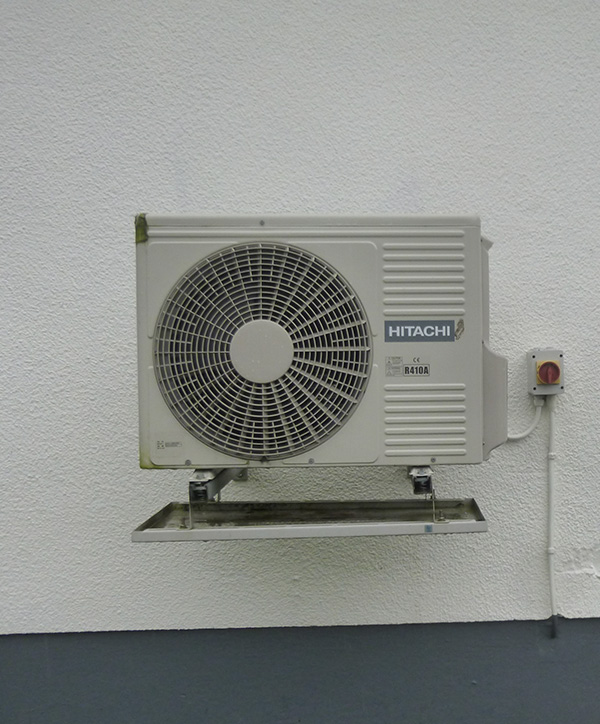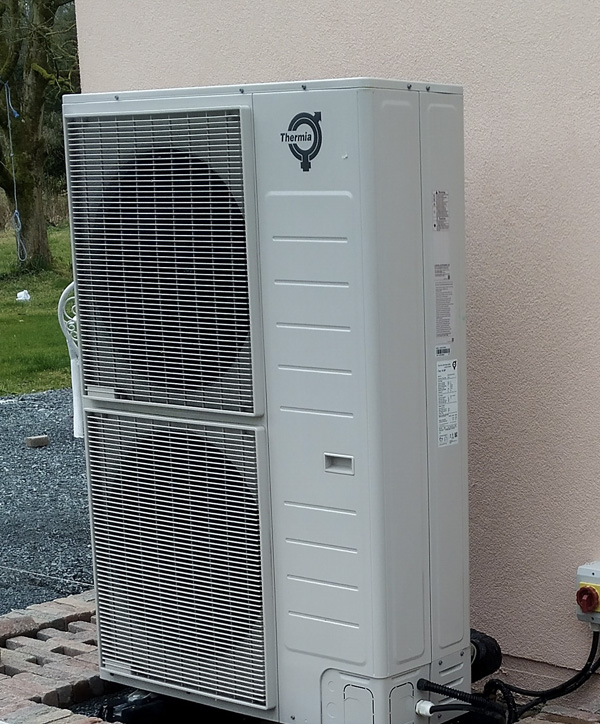Heat Pump Systems
What are heat pump systems?
Heat pump systems are a well-placed alternative to conventional gas or oil heating systems which can reduce energy costs, improve energy efficiency and lead to a reduction in your homes carbon emissions. Inefficient heating systems can waste energy and cost you more to maintain comfortable temperatures within your home.
A heat pump system is a low carbon heating system which can replace conventional gas or oil heating systems. A heat pump is an electric device which depending on the type converts energy from the air, ground, or water outside your home into useful heat.
What are the different types of heat pumps and how do they work?

Air Source Heat Pump
An Air Source Heat Pump is the most common heat pump system it is a system which absorbs heat from the outside air using an outdoor unit.
Contained within the outdoor unit is an evaporator and a fan. The latent heat which passes across the evaporator is used to increase the temperature of the refrigerant within the evaporator, turning the refrigerant to a gas. This gas is then passed through a compressor which increases the temperature to between 25 – 75°C. The higher temperature gas is passed through a plate heat exchanger and the high temperature from the gas is absorbed by the primary water within the heat pump system, this water is used to heat radiators, underfloor heating systems and provides hot water for your home.
Air source heat pumps can operate and extract heat from outside air when temperatures are as low as -25°C. The system does not require underground piping to source heat and so it is often easier to install and more affordable than other heat pump systems.
There are two main types of Air Source Heat Pumps:
1. Air to water: this type of heat pump system will distribute heat through your wet central heating system.
2. Air-to-air: this type of heat pump system will produce warm air which is circulated by fans to heat your home. Air-to-air units do not produce hot water.
Ground Source Heat Pump
Ground Source Heat Pumps (GSHPs) are less common than air source systems. GSHPs are sustainable systems which extract renewable heat energy from the ground, concentrating it and using it to supply heat and domestic hot water.
GSHPs involve the installation of collector pipework (ground loop) to be installed in your garden. This ground loop is used to circulate a mixture of water and antifreeze. The fluid absorbs heat from the ground and passes through a heat exchanger into the heat pump. This heat can then be used to heat your radiators, underfloor heating, and water in your home.
The length of the ground loop will be unique to the size of your home and your heat demand. This can be laid out horizontally at a shallow depth or vertically at a greater depth.
Water Source Heat Pumps (WSHPs) are another type of heat pump system although less common. WSHPs use open water such as lakes, streams, or rivers as a heat source to heat your home. WSHPs use submerged pipework to absorb heat from a water source in the same way as a GSHP operates. GSHPs and WSHPs are often more complex and expensive than their air source counterparts however, they are a more reliable system even in colder weather when air source systems may be required to work harder.
What are the benefits of Heat Pump Systems?
Replacing a conventional heating system with a heat pump system, particularly in a well-insulated dwelling, can transform the comfort levels in the home, while reducing running costs, energy usage and greenhouse gas emissions. In addition, most heat pump systems will also have integrated heating controls, which will give you full control over your heating and hot water requirements. It is estimated that the use of heating controls with your heat pump system will typically reduce your energy usage by up to 20%. In addition, a heat pump system can eliminate oil and gas bills from the home.
What do I need to consider before installing a Heat Pump System?
There are a few things which should be considered to determine if a heat pump system is the right choice for your home.
1. Do you have space outside your home where a unit can be installed?
The unit can be fitted to a wall or placed on the ground and should have adequate space around it to allow for good air flow.
For a GSHP, you will need to assess if your garden is suitable for digging a trench or borehole aswell as considering the accessibility to digging machinery.
2. What type of heating system will you use with the heat pump system?
Homes without a central heating system currently installed will be required to install one for a heat pump system to work.
Heat pumps perform well with underfloor heating or warm air heating as they operate at low temperatures if underfloor heating is not suitable for your property you may need to consider installation of larger radiators.
3.What fuel are you replacing with the heat pump system?
A heat pump system is more likely to pay for itself if it is replacing an expensive heating system such as electric or oil-fired central heating. It is unlikely you will save much on your heating if you are switching from mains gas.
4. Is your home well insulated?
It is important that your home is well insulated and draught proofed to minimise any heat loss and increase the efficiency of the heat pump system.
5. Do you require planning permission?
It is best to check with your local planning authority to find out if you require planning permission.
6.Costs and financial support
The homeowner should consider the indicative costs for a heat pump system before installation.
The cost of a system will be unique to the heating demand of your property and can be discussed with an installer.
Broadly, the cost of a ASHP can range between €8,500 – €14,500 depending on the size and power rating of the heat pump. A GSHP’s cost can range between €12,500 – €25,500 depending on the size of the heat pump, hot water cylinder and ground loop system.
It is also important to check what financial support is available to you to support the installation of a Heat Pump System such as the SEAI Home Energy Grants Programme.
Can I get a grant for a heat pump system?

The SEAI Better Energy Homes Programme – offers a Heat Pump System grant to support the installation of heat pump systems.
Support is available to all homeowners and landlords of dwellings built and occupied before 2011. It is important to note that a home has to be ‘heat pump ready’ before applying for grant support.
This means before applying for grant support you must engage with an independent SEAI Registered Technical Advisor. SEAI offer a €200 technical assessment grant to assist with the technical assessment of your home.
However, this is only payable in conjunction with the heat pump system grant and the technical advisor must be selected from the SEAI Registered Technical Advisor list.
An advisor will complete an assessment of your homes fabric heat loss and provide guidance on measures which will reduce fabric heat loss to an acceptable level to avail of the heat pump system grant. These measures are likely to include home energy upgrades such as insulation, windows, and doors. The required heat loss is expressed as a Heat Loss Indicator of 2 Watts/Kelvin/m². If you have an acceptable Heat Loss Indicator the SEAI Home Energy Grants Programme offers a grant value of up to €3,500 towards a heat pump system with the exception of air to air which is eligible €600 of grant support. For further details including the amount of grant support you may be eligible for click here.
